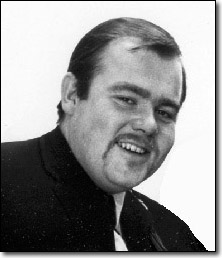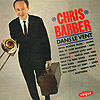 |
|||||
Stu Morrison played banjo and guitar (and occasionally sang) in the Barber Band from November 1964 to January 1971. He replaced Eddie Smith and was in turn replaced by Steve Hammond. Stu's distinctive sound was captured on many recordings, ranging from traditional jazz pieces (listen to 'London Blues' by clicking on the link at the bottom of this page) to the experimental-electric recordings on "Drat That Fratle Rat" and "Get Rolling". During Stu's tenure in the band the rest of the personnel remained fairly stable, with Chris, Pat, drummer Graham Burbidge, and guitarist John Slaughter providing continuity. Stu played with three bassists -- Dick Smith, Micky Ashman, and then Jackie Flavelle -- and it was of course during this period that Ian Wheeler left the band, being replaced by John Crocker. Stu Morrison, a Londoner, was born in 1939 and developed his interest in jazz through listening to British bands, notably Chris Barber and Ken Colyer. While still at school he started playing guitar in a skiffle group, then banjo tuned to guitar, and lastly tenor banjo (tuned to tenor). His first "proper" band was with Cuff Billett in Portsmouth -- they worked near each other. At the time he was living in Worthing, but working in Portsmouth as a laboratory assistant for a plastics, textiles, and rubber company. As Stu became more proficient he took lessons from John Bastable and started "sitting in" with the Colyer band on a regular basis. Later in 1960 or 1961 Stu turned professional with Pete Ridge, a drummer who had his own band. This band later became the Mike Cotton Jazzmen, when Pete was replaced by Jimmy Garforth, and later with a change in musical policy the band emerged as the Mike Cotton Sound. This led to a change in instrument for Stu as he then started playing bass guitar to play in the rhythm-&-blues format. During his time with Mike the band backed such pop stars as Gene Pitney, and British stars such as Clinton Ford, Sugar Pie DeSanto, Sonny Boy Williamson, Nat Gonella, and Jeannie Lamb (Mrs. Danny Moss). Stu also took on vocal duties with the band. Towards the end of 1964 Eddie Smith left Chris and Stu was asked to join. It was an interesting period for the band, having recently (during the summer of 1964) added guitarist John Slaughter (still with Chris!). The band had a great R&B sound to it, and also at that time the band were playing Balkan-style music (written by Chris). Ottilie also returned to the stage.
Stu can be heard to advantage on one of the Band's rarer albums, Dans Le Vent, recorded in April 1965, playing both guitar and banjo and also on solo vocals ("Long Tall Shorty" and "Howlin' For My Baby"). He also took part in the Collaboration album with Chris and Barry Martyn, and backed Kenneth Washington on two rare CBS singles (Kenneth had been part of The Alex Bradford Singers, and joined the band for a year in 1966-67 as gospel singer). Further albums followed, including Battersea Raindance, on which the band was joined by another ex-Mike Cotton Band member, John Crocker. Two live records were also made at this point: concerts in Hamburg (1967) and Berlin (1968). The latter concert was probably the highlight of Stu's time with the band: as he says, "On those long tours you were either flying or on your knees! That night we were flying, and you could really feel the atmosphere, with the band on top form." (Listen to the record, what Stu says really does come over). During his tenure, the band played with Albert Nicholas (Geneva, August 1968, a show which was broadcast), Sonny Boy Williamson, and other American and European artists. Stu left the band early in 1971 due to an escalating drink problem which he later overcame, and returned to work with Ken Colyer's "telephone band"* which became quite a regular outfit. In 1986 Stu started working in Drug and Alcohol rehabilitation work: he went to London University and Charing Cross & Westminster Medical School and gained a diploma in Drug and Alcohol studies, and then ran a clinic in London's Docklands. He retired in 1998. He started playing again in 1996, with musicians such as Derek Winters, Brian Carrick, Annie Hawkins, Colin Bowden, and Mike Pointon. He has also played with Tony Scriven in Portugal. His current regular band is Sid Bailey's Tailgate Six, which plays in the style of the New Orleans Dance bands of the 50s and 60s, and is enjoying himself. An unusual claim to fame is that Stu was the only banjoist ever to play at Ronnie Scott's, and nobody made any jokes about it! |
|||||
| Music: London Blues (Stu's choice), recorded in the Marquee Studios, London, 10 June 1970; Pat Halcox (trumpet), Chris Barber (trombone), John Crocker (clarinet), Stu Morrison (banjo), John Slaughter (guitar), Jackie Flavelle (bass guitar), Graham Burbidge (drums). | |||||
| Source: E-mail messages between Stu Morrison and Julian Purser. Copyright © 2004 www.chrisbarber.net and Stu Morrison & Julian Purser. | |||||
| * "Telephone Band": literally a band put together by the musician 'booker' who telephones like-minded jazzers, to play a gig probably that night or certainly that week. They are usually all known to each other and are friends. | |||||
| |

